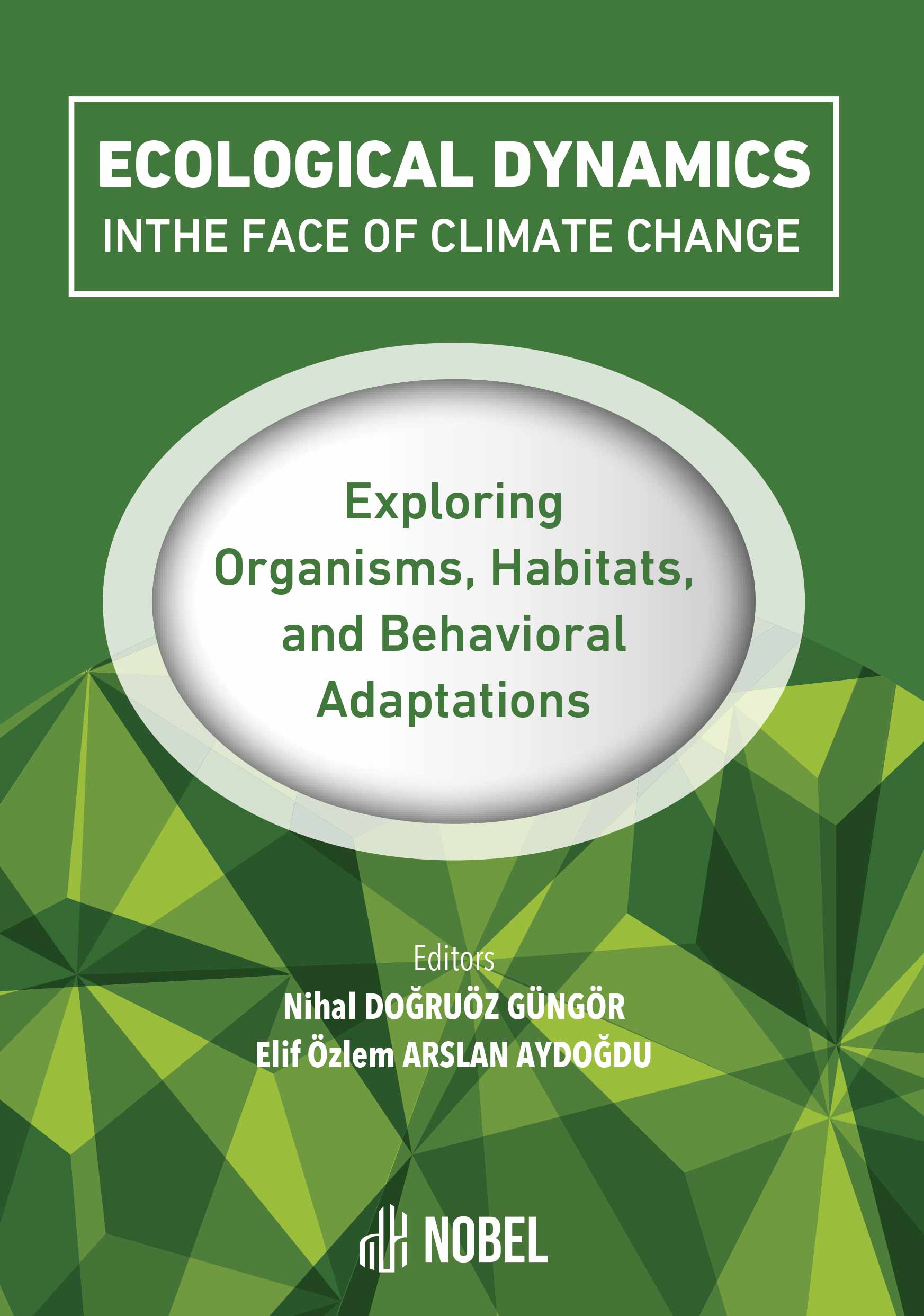Climate Change Impacts on Amphibians and Reptiles: Past, Present, and Future
Can Yilmaz (Author), Sezgin Karaman (Author)
Release Date: 2024-05-31
Many species extinctions have occurred in the Earth’s history, including five great mass extinctions. The phenomenon of climate change is likely to have profound effects on the diversity of living organisms. Globally, significant declines in biodiversity are being experienced. Especially ectothermal animals such as reptiles and amphibians are vulnerable to fluctuations in temperature and other [...]
Media Type
Buy from
Price may vary by retailers
| Work Type | Book Chapter |
|---|---|
| Published in | Ecological Dynamics in the Face of Climate Change |
| First Page | 205 |
| Last Page | 223 |
| DOI | https://doi.org/10.69860/nobel.9786053359258.12 |
| Page Count | 19 |
| Copyright Holder | Nobel Tıp Kitabevleri |
| License | https://nobelpub.com/publish-with-us/copyright-and-licensing |
Can Yilmaz (Author)
Professor, Aydın Adnan Menderes University
https://orcid.org/0000-0002-5994-508X
3Can YILMAZ is Professor in the Vocational School of Health at Hakkari University. He received Ph.D. in Biology from Aydın Adnan Menderes University and studied population genetic structure of loggerhead turtle in his Ph.D. His research interests involve population genetics and ecology of reptiles and amphibians. He has been conducted long-term conservation studies on green turtle, loggerhead turtle and the nile soft-shell turtle that nested in Turkey since 2001. He is also the director of Graduate Education Institute at Hakkari University.
Sezgin Karaman (Author)
Aydın Adnan Menderes University
https://orcid.org/0000-0001-8654-4452
3Sezgin KARAMAN working as lecturer in Animal and Plant production department at Vocational School of Yüksekova. He received Ph.D. in Biotechnology about microbial enzyzmes in Aydın Adnan Menderes University. His has been working and doing reserach on sea turtle conservations and population genetics projects since 2013. He research inerest involve, enzyme biotechnology, conservations projects, population genetics and moleculer ecology of sea turtles.
AmphibiaWeb2024. AmphibiaWeb. 2024. <https://amphibiaweb.org> University of California, Berkeley, CA,USA. Accessed 30 May 2024.
Berger, L., Speare, R., Daszak, P., Green, D. E., Cunningham, A. A., Goggin, C. L., Slocombe, R., Ragan, M. A., Hyatt, A. D., & McDonald, K. R. (1998). Chytridiomycosis causes amphibian mortality associated with population declines in the rain forests of Australia and Central America. Proceedings of the National Academy of Sciences, 95(15), 9031-9036.
Carroll, R. L. (1988). Vertebrate paleontology and evolution.
Change, C. (2001). Third assessment report of the intergovernmental panel on climate change IPCC (WG I & II). In: Cambridge Univ. Press, Cambridge.
Collins, M., Knutti, R., Arblaster, J., Dufresne, J.-L., Fichefet, T., Friedlingstein, P., Gao, X., Gutowski, W. J., Johns, T., & Krinner, G. (2013). Long-term climate change: projections, commitments and irreversibility.
Duellman, W. E., & Trueb, L. (1994). Biology of amphibians. JHU press.
Erwin, D. H. (1994). The permo–triassic extinction. Nature, 367(6460), 231-236.
IPCC. (2022). Summary for policymakers, IPCC working Group II report, Climate Change 2022: Impacts, adaptation and vulnerability. IPCC.
IUCN. 2023. IUCN. 2023. The IUCN Red List of Threatened Species. Version 2023-1. https://www.iucnredlist.org. Accessed on [30 5 2024].
Johnson, P. T., Chase, J. M., Dosch, K. L., Hartson, R. B., Gross, J. A., Larson, D. J., Sutherland, D. R., & Carpenter, S. R. (2007). Aquatic eutrophication promotes pathogenic infection in amphibians. Proceedings of the National Academy of Sciences, 104(40), 15781-15786.
Karl, T. R., Arguez, A., Huang, B., Lawrimore, J. H., McMahon, J. R., Menne, M. J., Peterson, T. C., Vose, R. S., & Zhang, H.-M. (2015). Possible artifacts of data biases in the recent global surface warming hiatus. Science, 348(6242), 1469-1472.
Maxwell, W. D. (1992). Permian and Early Triassic extinction of non-marine tetrapods. Palaeontology, 35(3), 571-583.
O’hanlon, S. J., Rieux, A., Farrer, R. A., Rosa, G. M., Waldman, B., Bataille, A., Kosch, T. A., Murray, K. A., Brankovics, B., & Fumagalli, M. (2018). Recent Asian origin of chytrid fungi causing global amphibian declines. Science, 360(6389), 621-627.
Scheele, B. C., Pasmans, F., Skerratt, L. F., Berger, L., Martel, A., Beukema, W., Acevedo, A. A., Burrowes, P. A., Carvalho, T., & Catenazzi, A. (2019). Amphibian fungal panzootic causes catastrophic and ongoing loss of biodiversity. Science, 363(6434), 1459-1463.
Sheehan, P. M. (2001). The late Ordovician mass extinction. Annual Review of Earth and Planetary Sciences, 29(1), 331-364.
Uetzetal.2023. Uetz, P., Freed, P, Aguilar, R., Reyes, F., Kudera, J. & Hošek, J. (eds.) (2023) The Reptile Database, http://www.reptile-database.org, accessed [30 May 2024].
Urban, M. C., Richardson, J. L., & Freidenfelds, N. A. (2014). Plasticity and genetic adaptation mediate amphibian and reptile responses to climate change. Evolutionary Applications, 7(1), 88-103.
Valenzuela, N., & Lance, V. (2004). Temperature-dependent sex determination in vertebrates. Smithsonian Books Washington, DC.
Van der Leun, J., Tang, X., & Tevini, M. (1995). Environmental effects of ozone depletion: 1994 assessment. AMBIO-STOCKHOLM-, 24, 138-138.
Wake, D. B., & Vredenburg, V. T. (2008). Are we in the midst of the sixth mass extinction? A view from the world of amphibians. Proceedings of the National Academy of Sciences, 105(supplement_1), 11466-11473.
West-Eberhard, M. J. (2003). Developmental plasticity and evolution. Oxford University Press.
Wignall, P. B., & Twitchett, R. J. (1996). Oceanic anoxia and the end Permian mass extinction. Science, 272(5265), 1155-1158.
Williams, J. W., Jackson, S. T., & Kutzbach, J. E. (2007). Projected distributions of novel and disappearing climates by 2100 AD. Proceedings of the National Academy of Sciences, 104(14), 5738-5742.
| onix_3.0::thoth | Thoth ONIX 3.0 |
|---|---|
| onix_3.0::project_muse | Project MUSE ONIX 3.0 |
| onix_3.0::oapen | OAPEN ONIX 3.0 |
| onix_3.0::jstor | JSTOR ONIX 3.0 |
| onix_3.0::google_books | Google Books ONIX 3.0 |
| onix_3.0::overdrive | OverDrive ONIX 3.0 |
| onix_2.1::ebsco_host | EBSCO Host ONIX 2.1 |
| csv::thoth | Thoth CSV |
| json::thoth | Thoth JSON |
| kbart::oclc | OCLC KBART |
| bibtex::thoth | Thoth BibTeX |
| doideposit::crossref | CrossRef DOI deposit |
| onix_2.1::proquest_ebrary | ProQuest Ebrary ONIX 2.1 |
| marc21record::thoth | Thoth MARC 21 Record |
| marc21markup::thoth | Thoth MARC 21 Markup |
| marc21xml::thoth | Thoth MARC 21 XML |

